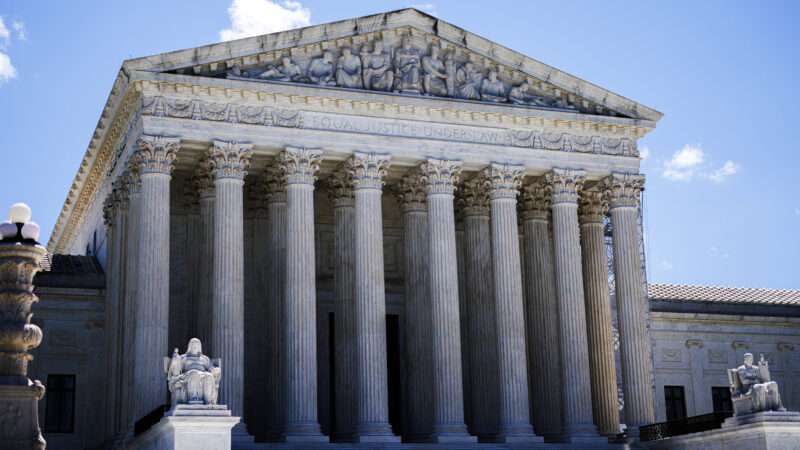
With a set of rulings handed down over the past week, the conservative majority on the U.S. Supreme Court decisively stood up for the due process rights of Americans who come into conflict with the administrative state.
On their own, each of those rulings is significant. In a pair of cases decided together last week, the Supreme Court overturned a decades-old precedent that required judges to defer to the supposed expertise of executive agencies. In scrapping the so-called Chevron doctrine, the Court leveled the playing field for legal challenges to regulatory rules.
In a separate case decided on Thursday, S.E.C. v. Jarkesy, the Court said that the Securities and Exchange Commission (SEC) must try civil fraud suits in federal district court rather than using its own, internal administrative law courts. The decision protects the right to a trial by jury and will ensure that fewer Americans will be forced to navigate the expensive, time-consuming administrative law system before getting their case heard by a real court.
Finally, on Monday, the Court ruled that businesses can challenge federal regulations within six years of suffering some harm at the hands of the administrative state. Previously, those challenges were limited to six years after the regulation itself was approved—an arrangement that effectively eliminated any hope of due process for those victimized by longstanding rules.
Linked together, the outcome of these four cases and three decisions is even greater than the sum of their parts. In identical 6–3 decisions, the Court's conservative majority sent a clear signal that federal judges ought to have the final say on matters involving the regulatory state—because that's the system our Constitution requires.
That's not a power grab by the federal judiciary—as some commentators have claimed—but a restoration of the proper role of judges as a check on executive agencies' power.
"Most people understand that, when it comes to criminal defendants, people deserve their day in court in front of a neutral arbiter. It should be equally common-sensical that when the accused is a family-run fishing business contesting an agency's power, or a man accused of breaking securities law, they also deserve these due process rights," Anastasia Boden, a senior attorney with the Pacific Legal Foundation, told Reason after these rulings were announced.
Boden said the Court's decisions over the past week are "merely an extension of due process rights for the accused to the behemoth administrative state. This is something that champions of a fair and just society should celebrate—just as they do in other contexts."
Not everyone is celebrating, however. In a dissenting opinion to Monday's Corner Post, Inc. v. Board of Governors of the Federal Reserve ruling, Justice Ketanji Brown Jackson warned that"the tsunami of lawsuits against agencies that the Court's holdings in this case and [the case that overturned the Chevron doctrine] have authorized has the potential to devastate the functioning of the Federal Government."
While that might sound awesome to libertarians, it's sadly not exactly true. The promised tsunami of cases will only materialize if the federal government continues to steamroll Americans' rights via the administrative state.
In so many words, Jackson is arguing that if the government violates due process frequently enough, then it should be allowed to keep doing that because fixing the situation—that is, ensuring that justice is served to the victims of federal overreach—will simply be too difficult for the courts. But if that's true, then why have courts and constitutional promises about due process in the first place?
The regulatory state will still exist. But now it will have to defend itself in front of real judges and juries and without the expectation that those judges and juries will simply go along with the idea that regulators must know best.
For a more rational view of what the Supreme Court is doing here, look to the majority opinion that overturned Chevron. In it, Chief Justice John Roberts wrote that the legal doctrine requiring judicial deference to the regulatory state had created "an eternal fog of uncertainty" about what the law actually says and that it had effectively allowed the administrative state to usurp the federal courts.
"Perhaps most fundamentally," Roberts wrote, "Chevron's presumption is misguided because agencies have no special competence in resolving statutory ambiguities. Courts do."
Due process matters, and judges are the arbiters of due process within our legal system. This should not be a controversial or radical perspective.
Trying to derive broad narratives from a series of Supreme Court rulings can be a fraught thing to do. Most cases are decided on narrow, legalistic grounds rather than being the sweeping statements that political media makes them out to be.
This, however, seems like an exception to that rule. The conservative majority on the Supreme Court has spoken with a clear voice. In doing so, it has confirmed that individuals and businesses subject to federal regulations have the right to defend themselves without having to navigate a rigged quasi-judicial process inside the executive branch.
Going forward, that means judges and courts will have fewer opportunities to dismiss cases and will instead have to consider the merits and constitutionality of the rules in question. That helps to restore the balance of power, not break it.
The post The Supreme Court Didn't Destroy the Regulatory State. It Stood Up for Due Process. appeared first on Reason.com.







